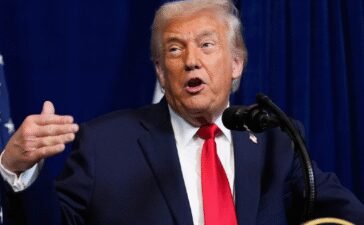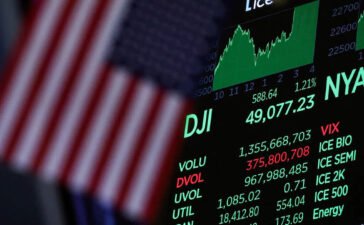July 2025 jobs report reveals major slowdown in hiring
The controversy began with the July 2025 U.S. jobs report released by the Bureau of Labor Statistics (BLS). The report showed that only 73,000 jobs were added in July, falling far short of Wall Street expectations. More alarmingly, the government revised previous months’ job gains down significantly—by a total of 258,000 jobs across May and June.
This sharp downward revision has raised concerns that the American economy is slowing more rapidly than previously thought. It also sent shockwaves through financial markets, reignited fears of a possible recession, and put the Federal Reserve in a tricky position regarding potential interest rate cuts.
President Trump calls jobs report “rigged” and fires BLS chief
President Donald Trump, who is seeking re-election this fall, did not hold back in his reaction. Within hours of the BLS release, Trump publicly called the numbers “rigged,” “a scam,” and fired the Bureau’s Commissioner, Dr. Erika McEntarfer, who was originally appointed under President Biden.
Trump accused McEntarfer and the agency of political manipulation, claiming the negative jobs report was deliberately skewed to damage his administration’s record on the economy. He went as far as calling the data a “deep state lie” intended to fuel voter distrust just before the election.
This isn’t the first time Trump has attacked federal institutions, but this move has sparked widespread criticism from economists, policymakers, and media outlets across the spectrum.
Paul Krugman: “Every accusation is a confession”
Leading the intellectual pushback is Paul Krugman, a longtime Trump critic and respected economist. Writing in response to Trump’s accusations, Krugman stated that “every accusation is a confession,” suggesting that Trump often blames others for the very things he’s guilty of doing. Krugman accused Trump of embracing a “paranoid style of politics” that undermines trust in core democratic institutions like the BLS. He stressed that data revisions are normal, especially during periods of economic volatility, and that Trump’s response only highlights his discomfort with reality.
In Krugman’s words, the danger isn’t just in Trump’s rhetoric — it’s in what he’s willing to dismantle to protect his image. “When leaders start dismissing facts as lies and firing neutral officials, democracy suffers,” he warned.
What the data really says about the job market and economy right now
Stripping away the noise, here’s a clearer picture of what the latest labor market data actually shows:
- July 2025: 73,000 jobs added (vs. 180,000 expected)
- May & June revisions: Total jobs cut by 258,000
- Unemployment rate: Slight uptick to 4.1%
- Wage growth: Still steady at 3.7% year-over-year
This data reflects a slowing but stable economy, not a collapse—and certainly not a government-led data conspiracy. Most independent economists agree that the labor market is adjusting as expected after years of aggressive post-pandemic growth and inflation-fighting monetary policy.
Economic experts explain why job data revisions are common
Several independent economists have stepped forward to clarify what’s really happening with the job numbers. According to Jeffrey Roach, Chief Economist at LPL Financial, “downward revisions are common when the economy begins to slow down. Employers typically report data late or revise their numbers as trends shift.”
Jamie Cox of Harris Financial Group added that the weak jobs data and revisions could nudge the Federal Reserve to consider rate cuts to keep the economy from tipping into recession. While the headlines were shocking, most experts agree that the changes reflect real-time corrections — not conspiracy.
In fact, experts pointed out that job market reports often undergo revisions for accuracy, and this cycle is no different from previous economic slowdowns.
Is the U.S. economy really slowing down, or is it just statistical noise?
Despite the political drama, economists say there is real concern beneath the headlines. A consistent theme across recent data points to a gradual slowdown in job growth, falling from the robust pace seen earlier in the year. While 73,000 new jobs in July may still reflect expansion, it’s far from the 200,000+ averages seen in the first quarter.
Coupled with the large downward revisions to prior months, experts believe the economy may be entering a cooling phase, likely influenced by:
- High interest rates by the Federal Reserve
- Slower consumer spending
- Reduced business hiring amid political uncertainty
These shifts don’t signal a recession yet, but they do suggest that America’s post-COVID boom is tapering off.
Trump’s politicization of economic data raises serious concerns
While it’s not unusual for presidents to spin economic data in their favor, Trump’s decision to fire the head of the BLS has drawn sharp criticism from economists, political analysts, and even former government officials. Many see it as a direct threat to the independence of federal institutions responsible for delivering unbiased, factual information to the public. Critics argue that politicizing trusted data not only damages credibility but also sets a dangerous precedent, where economic reports could be shaped by political agendas rather than truth. This move has raised serious concerns about transparency, accountability, and the future of data integrity in American governance.
FAQs:
Q: Why did Paul Krugman criticize Donald Trump over the jobs report?
A: He said Trump’s “rigged” claim was dishonest and dangerous to democracy.
Q: What did Donald Trump do after the July 2025 jobs report?
A: He fired the BLS chief and claimed the data was fake.







